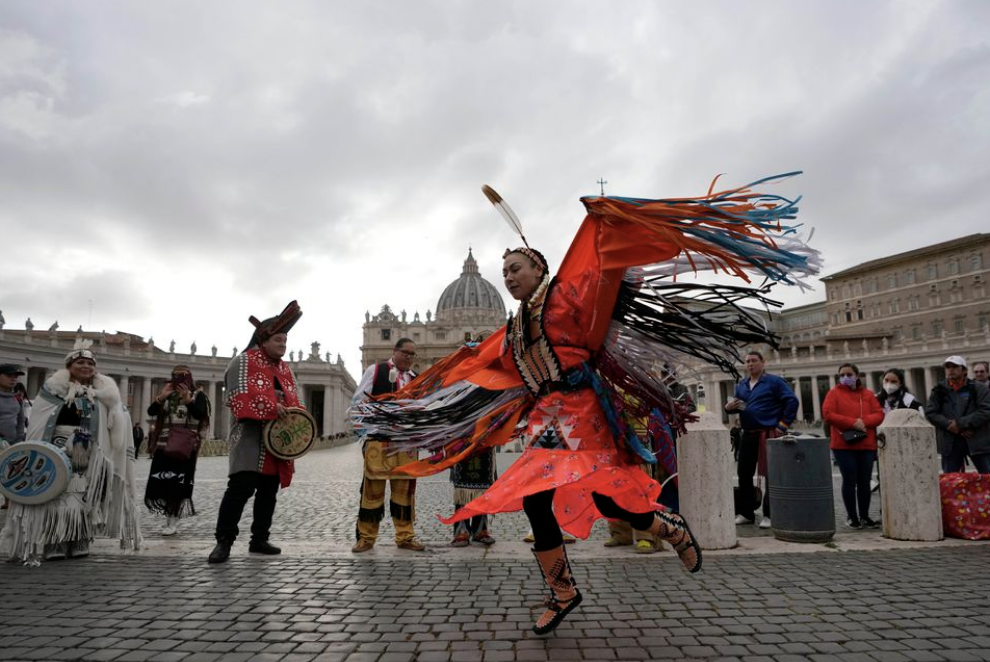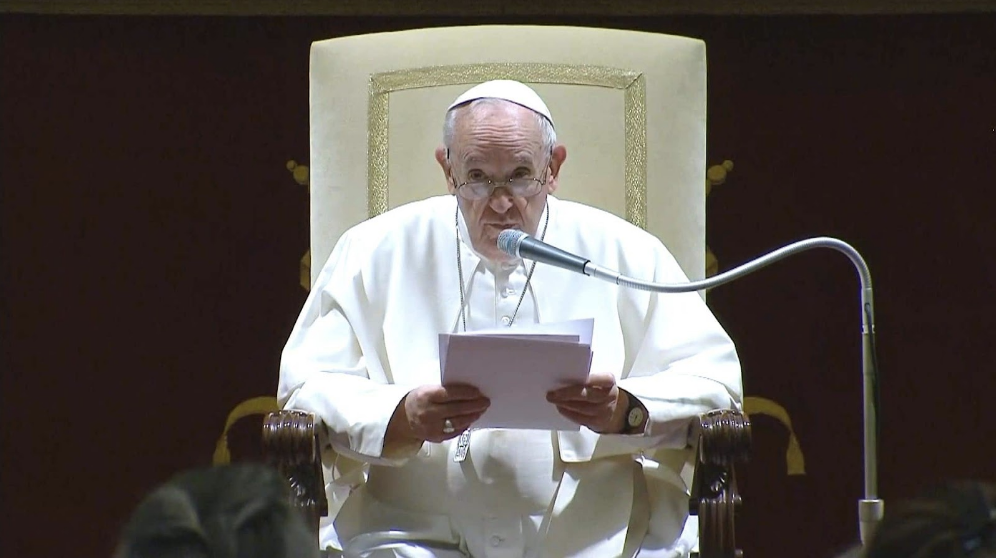Pope Offers Official Apology to Canadian Indigenous Communities
A First Nations member dances in St. Peter’s Square on March 31st, 2022. Photo: Alessandra Tarantino / Associated Press.
The Pope’s statement was unexpected and intense. An Inuit elder wept in disbelief of what she had heard. For all the talks Indigenous members had with Pope Francis over the course of last week, leaders were still stunned to hear the Catholic Church issue a formal apology on Friday for its past role in the Canadian residential school system, shifting the conversation as to what must be done next for reconciliation.
“For the deplorable conduct of those members of the Catholic Church, I ask forgiveness of the Lord,” Francis said to a room filled with 200 First Nations, Metis, and Inuit delegates, leaders and residential school survivors.
Acknowledging in the Sala Clementina hall of the Apostolistic Palace that Native “identity and culture has been wounded” by the Church’s hands, he joined Canadian bishops in asking for a pardon from the community.
Canada’s residential schools were designed to “civilize and Christianize” Aboriginal children by raising them in government-supported religious schools. Usually forcefully separated from parents and taught in an environment rife with abuse, over 150,000 children were sent to Anglican, Presbyterian, United and Catholic-run schools from the late 1800s up to as recently as 1996.
The legacy of schooling has been a difficult topic in Canadian history, and the pain stands fresh for Indigenous people. In 2015, Canada’s Truth and Reconciliation Commission reported that the actions undertaken by government and church officials in the school amounted to cultural genocide. Hundreds of unmarked graves continue to be discovered near former school grounds in an apparent sign of the secret death toll that such schooling inflicted.
As the primary operator for up to 60% of Canada’s residential schools, the Catholic Church has long been withholding on records of its actions within the schools. It was also the only remaining institution from the school system which had avoided apologizing for its involvement.
Last year, Pope Francis raised hopes among Indigenous communities when he invited community members to meet at the Vatican while also agreeing to visit Canada at a later date. His statement at the time coincided with the Canadian Conference of Catholic Bishops’ formal apology for the residential schools.
Pope Francis reads a formal apology to Indigenous delegates on April 1st, 2022. Photo: CBC News.
The Pope’s official apology now comes as a sign of success for many of the attending members at the Vatican, who pushed for an atonement during individual talks with the Pope to truly begin the healing process. “I didn’t expect an apology,” Grand Chief Stewart Phillip admitted. “It represents a fundamental and genuine first step along the path of genuine reconciliation.”
Francis’ word was also accompanied with a commitment to visit Canada around the Feast of St. Anne, which falls on July 26th. “Between now and his visit to Canada, I hope Pope Francis will continue to reflect upon our words and truths of our survivors, and on the immense harm caused by individuals as well as the Church itself,” an Indigenous leader present at the announcement declared.
Nevertheless, the embrace is also met with the painful past that belied the Catholic Church’s sudden attempted rapprochement. Osoyoos Indian band chief Clarence Louie stated he was “angry and disappointed” by the Church’s statement, and affirmed the apology was only political. “When someone is forced to apologize, I don’t think that is a sincere apology.”
Apologizing, however, did provide an initial sense of relief to many of the Indigenous members present at the Holy See. During the visit, performers were able to dance, play music, and host a Sunrise Ceremony for the Pope. Gifts were passed onto the Pope as a symbol of Indigenous presence.
Prime Minister Justin Trudeau additionally celebrated the move in a statement on April 1st, calling the move “a step forward in acknowledging the truth of the past” and affirming the nation’s dedication to addressing its past issues.
The move remains divisive, and questions continue to persist in the leadup to the Church’s visit as to what will be done after the apology. The event, however, is expressed as a sign of pride in the eyes of Saskatchewan dancer Kevin Wayhe. “I see it in him that he appreciated it, to learn of our ways.”


